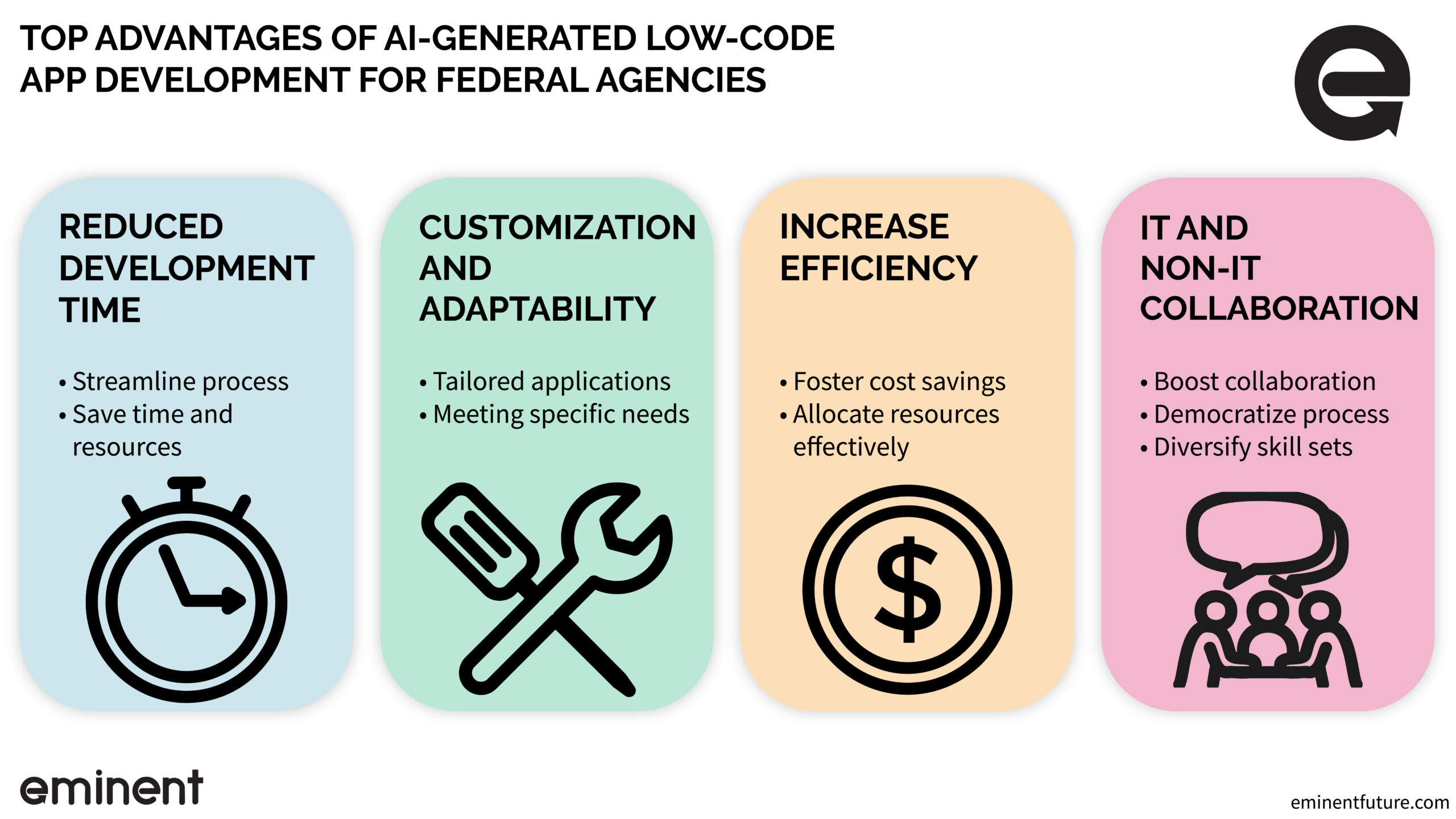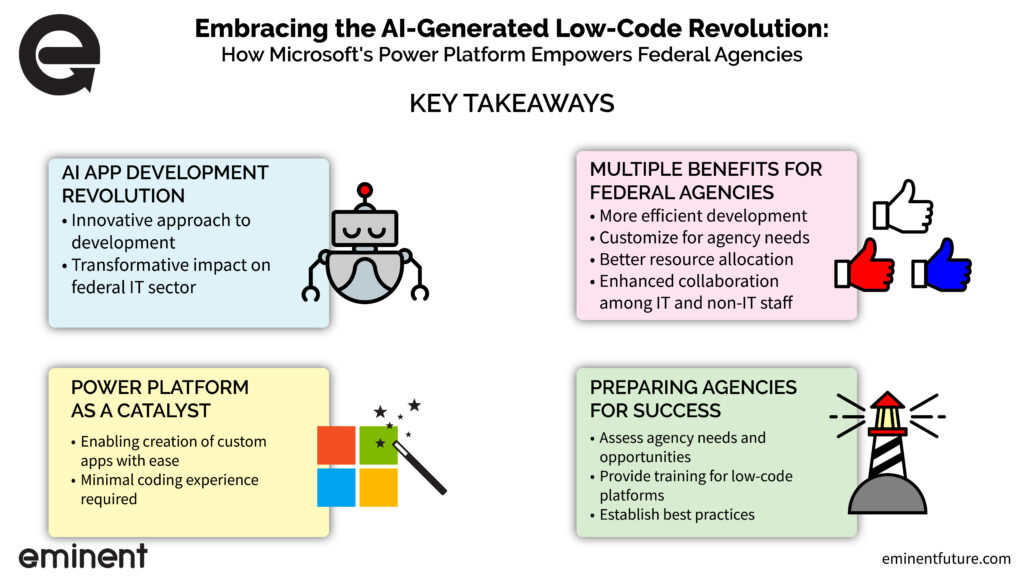
The app development world is evolving rapidly, and one of the most significant advancements in recent years has been the rise of AI-generated low-code app development. Microsoft’s Power Platform is at the forefront of this revolution, enabling federal agencies to create powerful, customized applications with minimal coding experience.
In this article, we will explore the benefits of AI-generated low-code app development for federal agencies and guide how directors can prepare their organizations for this new era.
- Discover the transformative impact of AI-generated low-code app development on federal IT
- Explore Microsoft Power Platform’s role in enabling federal agencies to create custom applications
- Learn about the numerous benefits, including increased efficiency, customization, reduced costs, and enhanced collaboration
- Understand how agency directors can prepare their organizations for successful adoption of AI-generated low-code app development
Microsoft Power Platform: A Game-Changer

Microsoft Power Platform is a comprehensive suite of tools designed to empower organizations to create custom applications, automate processes, and analyze data. The platform includes Power Apps, Power Automate, Power BI, and Power Virtual Agents, each playing a crucial role in facilitating AI-generated low-code app development.
By leveraging AI and pre-built templates, the Power Platform simplifies the app development process, allowing users with minimal coding experience to create sophisticated applications. This groundbreaking approach opens up new possibilities for federal agencies, enabling them to harness the power of technology without needing extensive technical expertise.
Benefits of AI-Generated Low-Code App Development for Federal Agencies

Increased Efficiency and Reduced Development Time
- Accelerated app development process
- Faster deployment of custom applications
AI-generated low-code platforms, such as Microsoft’s Power Platform, bring a significant advantage to federal agencies by automating various aspects of the development process. This automation leads to a substantial reduction in the time required to build and deploy custom applications.
As a result, agencies can achieve their goals more efficiently, ultimately enabling them to deliver better services to their constituents.
Customization and Adaptability
- Tailored applications for specific needs
- Flexible and adaptable solutions
Low-code platforms offer a high level of customization, empowering federal agencies to create applications that cater specifically to their needs and requirements. With the ability to easily modify and adapt solutions, agencies can ensure that their applications remain relevant and practical as their operational landscape evolves. This flexibility is essential in the ever-changing world of technology and allows federal agencies to stay ahead of the curve.
Lower Costs and Resource Requirements
- Reduced development costs
- More effective resource allocation
With a decreased need for specialized coding skills, AI-generated low-code platforms enable federal agencies to save on development costs. This cost-effectiveness allows for a more efficient allocation of resources in terms of budget and personnel. As a result, agencies can focus on other critical areas of their operations, improving overall performance and outcomes.
Enhancing Collaboration Between IT and Non-IT Personnel
- Democratized development process
- Inclusive collaboration across teams
With a decreased need for specialized coding skills, AI-generated low-code platforms enable federal agencies to save on development costs. This cost-effectiveness allows for a more efficient allocation of resources in terms of budget and personnel. As a result, agencies can focus on other critical areas of their operations, improving overall performance and outcomes.
Real-World Use Cases for Federal Agencies

There are numerous potential applications for AI-generated low-code app development within federal agencies. For example:
- Streamlining internal processes: Agencies can create custom applications to automate repetitive tasks, reducing manual effort and increasing efficiency.
- Enhancing data analysis and reporting: Agencies can leverage Power BI to create interactive dashboards and visualizations, enabling them to make data-driven decisions.
- Improving citizen engagement: Federal agencies can develop user-friendly applications to facilitate communication and interaction with citizens, providing easier access to information and services.
Preparing Federal Agencies for the AI-Generated Low-Code App Revolution

- Assess and identify opportunities
- Provide training and resources
- Establish guidelines and best practices
- Collaborate with IT teams
To successfully adopt AI-generated low-code app development in federal agencies, directors should consider taking the following steps:
Assess Existing Processes and Identify Opportunities
Evaluate your agency’s current processes and pinpoint areas where custom applications could enhance efficiency and improve outcomes. By identifying these opportunities, directors can prioritize implementing low-code solutions, ensuring a targeted and impactful approach.
Provide Training and Resources
Equip employees with the necessary training and resources to become familiar with low-code development platforms and techniques. Investing in skill development will empower your workforce to make the most of this innovative technology, maximizing the benefits for your agency.
Establish Guidelines and Best Practices
Create clear guidelines and best practices for using low-code tools. Ensuring that applications are secure, reliable, and adhere to industry standards is crucial for maintaining trust and confidence in the solutions your agency develops. This will also help to mitigate potential risks associated with deploying new technology.
Collaborate with IT Teams
Collaborate actively with IT teams to integrate applications appropriately into existing systems and workflows. This collaboration is essential for seamless implementation and allows for optimizing new low-code applications within your agency’s broader IT ecosystem.
By addressing potential challenges, such as data security concerns and platform scalability, federal agency directors can ensure a successful implementation of AI-generated low-code app development, ultimately driving innovation and efficiency across their organizations.
Key Takeaways

THE BOTTOM LINE
AI-generated low-code app development, led by Microsoft’s Power Platform, transforms how federal agencies approach app development. By embracing this innovative technology, directors can unlock new efficiencies, improve collaboration, and better serve their constituents.



